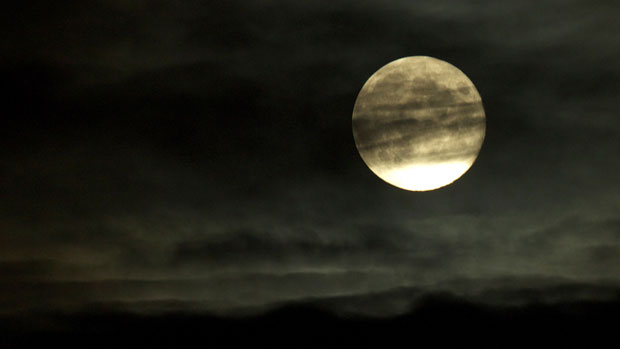Why Friday the 13th really is unlucky for some
Superstition around the ill-omened date can have real-world consequences

A free daily email with the biggest news stories of the day – and the best features from TheWeek.com
You are now subscribed
Your newsletter sign-up was successful
Today is Friday the 13th - and we all know that's supposed to mean bad luck.
The date has been regarded as ominous for centuries, and the phobia even has two different names - paraskevidekatriaphobia (from the Greek word Paraskevi, meaning Friday) and friggatriskaidekaphobia (for the Norse god Frigg, after whom Friday is named in English).
Although it is quite common for the 13th day of the month to fall on a Friday - we’re due another in December - today will bring at least one rare phenomenon.
The Week
Escape your echo chamber. Get the facts behind the news, plus analysis from multiple perspectives.

Sign up for The Week's Free Newsletters
From our morning news briefing to a weekly Good News Newsletter, get the best of The Week delivered directly to your inbox.
From our morning news briefing to a weekly Good News Newsletter, get the best of The Week delivered directly to your inbox.
Tonight’s full moon coincides with the satellite’s peak distance from the Earth, meaning stargazers will see a “micro-moon” - one that appears smaller and dimmer than usual, says The Independent.
Lending the extraterrestrial event a supernatural frisson, “it is the first time in 13 years that a full moon has appeared on Friday the 13th, and it won't happen again until May 2033 - in 13 years time”, says the newspaper.
Fears surrounding specific dates vary around the world: in Spanish-speaking countries and in Greece, it is Tuesday the 13th that frightens people. In Italy, it is Friday the 17th.
Yet much of the English-speaking world remains wedded to the idea that Friday the 13th poses the real threat.
A free daily email with the biggest news stories of the day – and the best features from TheWeek.com
Why is Friday the 13th seen as unlucky?
Many cultures and religious traditions consider Friday an unlucky day and 13 an unlucky number. In numerology, 13 is deemed an “irregular number”, associated with chaos and misfortune.
Historically, Friday was the day people were hanged in Britain, while the Christian tradition generally holds that Jesus was crucified on a Friday. Geoffrey Chaucer in the Canterbury Tales also references it as an unlucky day: “And on a Friday fell all this mischance,” he writes.
In addition, the number 13 has long had a supernatural connection. Looking through court records of 16th century witch trials, there are multiple references to the “fact” that 13 witches are needed to form a coven, according to the Encyclopedia of Witches, Witchcraft and Wicca.
Another story suggests the Friday the 13th superstition comes from the imprisonment and execution of hundreds of Knights Templar by the French king Philip IV in on Friday 13 October 1307. The theory was popularised by Dan Brown’s 2003 novel The Da Vinci Code. According to National Geographic, however, “although some of the Knights Templar were arrested on Friday, October 13, 1307, that isn’t the origin of the superstition”.
The magazine says that despite the truth to the story, it is more than likely a false association: “sometimes people make things up to give recent phenomena like Friday the 13th a more profound, historical origin.”
Whatever its true origin, the widespread superstition explains why many hotels and apartment buildings do not have a 13th floor and why some passenger planes do not have a row 13.
Is Friday the 13th actually unlucky?
Analysis of ten years’ worth of data from car insurer Aviva found accident claims increased by an average of - you guessed it - 13% on Friday the 13th.
Dr Caroline Watt, from the University of Edinburgh’s department of psychology, told the The Daily Telegraph holding such superstitions could prove the greatest risk. She said: “If people believe in the superstition of Friday the 13th then they believe they are in greater danger on that day. As a result they may be more anxious and distracted and this could lead to accidents. It becomes a self-fulfilling prophecy.”
However, other studies suggest fewer accidents and fires occur because people take more care, says The Independent.
Dr Donald Dossey, author of Holiday Folklore, Phobias and Fun, claimed Friday the 13th costs the US economy about $800-$900m because people are afraid to fly or make big financial decisions on the day.
Indeed, research by Find a Property found that from 2005 to 2012, there were 43% fewer transactions on Fridays the 13th than on other Fridays.
-
 Political cartoons for February 15
Political cartoons for February 15Cartoons Sunday's political cartoons include political ventriloquism, Europe in the middle, and more
-
 The broken water companies failing England and Wales
The broken water companies failing England and WalesExplainer With rising bills, deteriorating river health and a lack of investment, regulators face an uphill battle to stabilise the industry
-
 A thrilling foodie city in northern Japan
A thrilling foodie city in northern JapanThe Week Recommends The food scene here is ‘unspoilt’ and ‘fun’